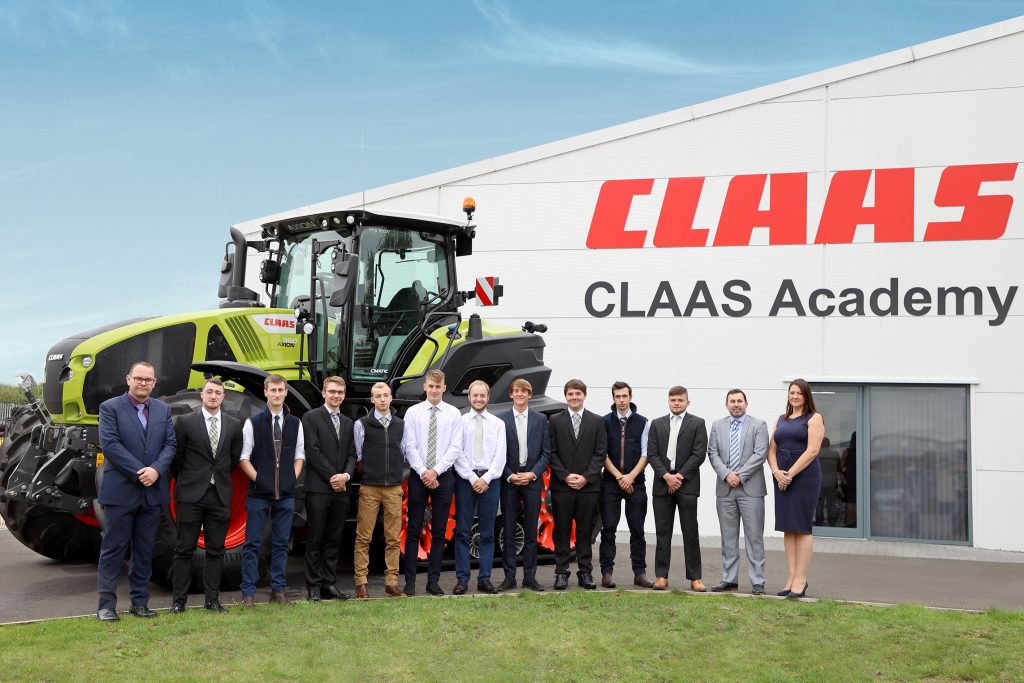Encouraging young people into agricultural careers
20th November 2019
Farmers Guide editor Rachel Hicks discusses how the industry is igniting the imagination of the younger generation.
Farmers Guide editor Rachel Hicks discusses how the industry is igniting the imagination of the younger generation.

Pictured with Reaseheath College staff Scott Wiffen (far left), Paul Spearitt (second from right) and Sharon Yates (far right) are some of the 2019 Claas apprenticeship scheme graduates (l-r) Dean Jarvis, Toby Gardiner, Tobias Weeks Baker, Tobias Peissel, James Walsh, Jack Brinkley, Robbie Spurgeon, Nick Corcoran, Robert Wheeler and Benjamin Harper
At a time when politics and climate change are shaking the agricultural world, it’s encouraging to see so many initiatives working to get the younger generation in particular excited about farming and the wider agri industry.
Tom Martin, a mixed sheep and arable farmer from Peterborough, set up FaceTime a Farmer as a nationwide project back in 2018 as a way to make learning about farming easy, accessible and fun and the initiative has gathered in momentum, so far resulting in over 300 teacher and farmer pairings across the UK. The main premise of FaceTime a Farmer is to ‘inspire, engage and educate young people, about not only the journey from farm to fork, but also the ever-changing, diverse agricultural industry.’ Tom teamed up with LEAF (Linking Environment and Farming) to help take the scheme nationwide. Speaking as one of its sponsors, Strutt & Parker head of rural consultancy, James Farrell, said: “With everything going on around the Agriculture Bill, and the change in the way farming will be funded in future, there has never been a more vital time to inform about all the good work that farmers do.” Seeing the agri world from within the farm gate will no doubt
lead to a new generation of farmers.
The NFU has also been busy in schools of late, thanks to a £25,000 grant from the government-backed ‘opportunity area’ programme. Education consultant Learn by Design helped the NFU deliver the Back British Farming project to five of Derby’s inner-city primary schools, with 300 students coming together in October for a launch event. Workshops investigated alternative energy production on farms and a year in the life of an arable farm, where students planted wheat seeds, flew drones and ground their own grain. NFU president Minette Batters said: “By funding these activities we can open young eyes to opportunities that otherwise might have passed them by. If we spark children’s interest now and build their knowledge of food, farming and the countryside, we can open up endless possibilities for their future.”

Pictured with SRUC Barony staff Fraser Wilson (far left) and Phil Naish (far right)) are more of the 2019 Claas apprenticeship scheme graduates (l-r) Jamie Stewart, Ben Hyslop, Scott McLaren, Alexander Watson and Lawrence
Even the supermarkets and fast food chains are jumping on board, with discounter Lidl announcing it will be launching a young farmers programme to offer support for new talent in the British farming industry. McDonald’s is also getting involved, with its Progressive Young Farmer placement scheme. According to McDonalds, those successful in gaining a placement will: ‘Kick-start their career in farming by spending a year tracing every step of our supply chain. Mentored by a host farmer as well as some of the UK’s leading food-supply companies, they’ll develop in-depth experience in sectors such as beef, pork, potatoes, dairy and poultry farming – as well as an understanding of the whole agricultural supply chain. We’ll challenge them to develop a broad range of knowledge that’s needed to succeed in today’s farming sector, including business skills and technological know-how.” The scheme promises that students will be equipped with the knowledge and practical expertise required to successfully work on a farm and in the wider supply chain.
Of course, a career in the agri industry doesn’t just mean farming – there’s a diverse range of careers, working both up and down the supply chain. The sector needs manufacturers, distributors, researchers, sales executives, people managers, traders, advisers, buyers, technologists, product managers, technicians, marketeers and logistics experts. Increasing numbers of farmers are adopting precision farming techniques that use GPS, drones, robotics and data analysis, taking food production to the next level. This growth in technology and the speed at which it happens means huge opportunities exist for those with an aptitude for science, maths and engineering.
With the recruitment, training and retention of high-quality service engineers posing a major issue for agricultural dealerships, many machinery companies offer apprenticeship schemes. For example, Claas offers career pathways for both younger people and also those seeking a career change via the Claas Academy and Claas Agricultural Apprenticeship. Claas UK chief executive officer, Trevor Tyrell, said: “Agriculture is an exciting industry that uses state-of-the-art technology on a par with aerospace. It has embraced the internet, satellite technology and computers like no other, as we continue to develop machinery that will help farmers feed an ever-growing population.” Sixteen apprentices recently graduated from the Claas apprenticeship scheme and began their careers at the end of October (pictured).

Jacob Chater, former Claas graduate and now service manager for Manns Spaldwick
The perception of a service engineer as being a fairly ‘low skill’ job is totally at odds with the reality, and serious opportunities within the industry are available, with many graduates working their way into positions of responsibility quite quickly. Jacob Chater (pictured) graduated from the CLAAS Apprenticeship in October 2018 and is now the service manager for Manns in Spaldwick. Jacob said: “I started my apprenticeship in July 2014 and finished in 2018 having achieved Overall Apprentice of the Year. The Claas scheme, with the aid of Reaseheath College, allowed me to get to the position I’m in today.”
John Deere’s Ag Tech, Parts Tech and Turf Tech apprenticeship programmes run in partnership with its dealer network and national training provider, ProVQ. Ag Tech won the only National Training Award ever made to an agricultural machinery apprenticeship programme. Less well-known is the company’s sponsorship of the British Guild of Agricultural Journalists John Deere Training Award, a practical course for aspiring agricultural journalists – our own Dominic Kilburn and Greg Goulding both ‘graduated’ from this unique scheme, which runs in July each year.
Farmers have a huge responsibility as countryside custodians, and are vital in the fight to protect it for future generations – but we also need to recruit these future generations to join that fight.


